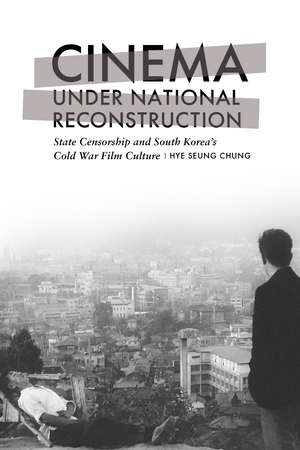Cinema under National Reconstruction: State Censorship and South Korea’s Cold War Film Culture
Autor Hye Seung Chungen Limba Engleză Paperback – 15 noi 2024
Preț: 254.70 lei
Nou
Puncte Express: 382
Preț estimativ în valută:
48.74€ • 52.12$ • 40.64£
48.74€ • 52.12$ • 40.64£
Carte disponibilă
Livrare economică 27 martie-10 aprilie
Livrare express 12-18 martie pentru 25.93 lei
Preluare comenzi: 021 569.72.76
Specificații
ISBN-13: 9781978838710
ISBN-10: 1978838719
Pagini: 252
Ilustrații: 24 B-W images
Dimensiuni: 156 x 235 x 18 mm
Greutate: 0.36 kg
Editura: Rutgers University Press
Colecția Rutgers University Press
ISBN-10: 1978838719
Pagini: 252
Ilustrații: 24 B-W images
Dimensiuni: 156 x 235 x 18 mm
Greutate: 0.36 kg
Editura: Rutgers University Press
Colecția Rutgers University Press
Notă biografică
HYE SEUNG CHUNG is the co-author of Movie Minorities: Transnational Rights Advocacy and South Korean Cinema (Rutgers University Press, 2021) and Movie Migrations: Transnational Genre Flows and South Korean Cinema (Rutgers University Press, 2015), and the author of Hollywood Diplomacy: Film Regulation, Foreign Relations, and East Asian Representations (Rutgers University Press, 2020), Hollywood Asian: Philip Ahn and the Politics of Cross-Ethnic Performance, and Kim Ki-duk.
Cuprins
NOTE ON TEXT
CHRONOLOGY
A LIST OF AGENCIES AND ACRONYMS
INTRODUCTION: Archival Revisionism and New Korean Film Historiography
CHAPTER 1: Fending off Darkness, Uplifting National Cinema: Korean Film Censorship and The Stray Bullet
CHAPTER 2: From Blackboard Jungle to The Teahouse of the August Moon: Censoring Hollywood in Postcolonial Korea
CHAPTER 3: Myths of Martyrs and Heroes in a Godless Land: Interagency Regulation of 1960s Anticommunist Films
CHAPTER 4: Cinematic Censorship as Sentimental Education: Indoctrinating Gaiety as National Emotion in Yushin-Era Youth Comedies
CHAPTER 5: Censors as Audiences and Vice Versa: Sex, Politics, and Labor in 1981
CHAPTER 6: Beyond Oral Histories and Trade Legends: A Bourdieusian-Foucauldian Deconstruction of Anti-Censorship Myths
EPILOGUE: Media Ratings, the End of Censorship?
ACKNOWLEDGMENTS
INDEX
Recenzii
"Theoretically sophisticated and extensively researched, Hye Seung Chung’s Cinema under National Reconstruction reveals the ways in which multiple actors (the state, the film industry, the public) negotiate the definition of national cinema. A groundbreaking work that takes Korean film censorship studies to a new level."
“Hye Seung Chung’s brilliant book deepens our understanding of cinema as a site of social and political contest. The product of impressive research in Korean and American archives, it offers a rare comparative perspective on censorship practices on both sides of the Pacific. Chung challenges conventional wisdom about the always-deleterious effects of censorship and profoundly revises our understanding of Korean filmmakers’ relationship to the state. Her analysis of government and industry records provides an important corrective to scholars’ reliance on the words and perspectives directors, who were often sidelined during the censorship process. A major contribution to postwar Korean film history.”
"Hye Seung Chung's provocative study sheds new light on the ways state censorship functioned—and malfunctioned—in Korea during the Cold War. She challenges the usual narrative—in which an oppressive, all-powerful censorship regime strangled artistic creativity in the Korean motion picture industry—and argues instead for a more nuanced understanding both of the apparatus of state censorship and the ways Korean filmmakers operated within and around it."
“Hye Seung Chung’s brilliant book deepens our understanding of cinema as a site of social and political contest. The product of impressive research in Korean and American archives, it offers a rare comparative perspective on censorship practices on both sides of the Pacific. Chung challenges conventional wisdom about the always-deleterious effects of censorship and profoundly revises our understanding of Korean filmmakers’ relationship to the state. Her analysis of government and industry records provides an important corrective to scholars’ reliance on the words and perspectives directors, who were often sidelined during the censorship process. A major contribution to postwar Korean film history.”
"Hye Seung Chung's provocative study sheds new light on the ways state censorship functioned—and malfunctioned—in Korea during the Cold War. She challenges the usual narrative—in which an oppressive, all-powerful censorship regime strangled artistic creativity in the Korean motion picture industry—and argues instead for a more nuanced understanding both of the apparatus of state censorship and the ways Korean filmmakers operated within and around it."
Descriere
Drawing upon primary documents from the Korean Film Archive’s digitized database and framing South Korean film censorship from a transnational perspective, Cinema Under National Reconstruction redefines censorship as a productive feedback system where both state regulators and filmmakers played active roles in shaping the new narrative or sentiment of the nation on the big screen.
